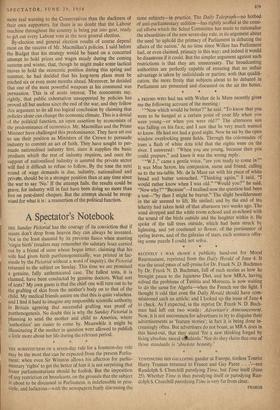liI II SUBSTITUTION OF a seven-day rule for a fourteen-day
rule may be the most that can he expected from the present Parlia- ment; when even Sir Winston allows his affection for parlia- mentary `rights' to get the better of him it is not surprising that lesser parliamentarians should be foolish. But the imposition of any restriction on broadcasts, on the grounds that the subject Is about to be discussed in Parliament. is indefensible in prin- ciple, and ludicrous—with the newspapers freely discussing the same subjects—in practice. The Daily Telegraph—no hotbed of anti-parliamentary sedition—has rightly scoffed at the comi- cal efforts which the Select Committee has made to rationalise the absurdities of the new seven-day rule, in its argument about the need `to uphold the primacy of Parliament in debating the affairs of the nation.' At no time since Wilkes has Parliament had, or even claimed, primacy in this way; and indeed it would be disastrous if it could. But the simpler argument against such restrictions is that they are unnecessary. The broadcasting authorities are perfectly capable of ensuring that no unfair advantage is taken by individuals or parties; with that qualifi- cation, the more freely that subjects about to be debated in Parliament are presented and discussed on the air the better.


































 Previous page
Previous page